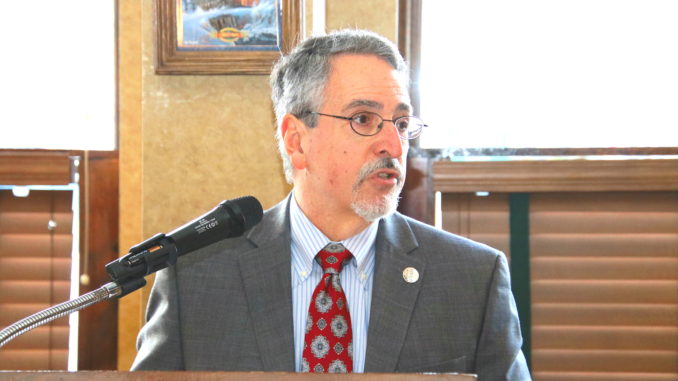
HILLSDALE, N.J.—As he suggested he might after the controversial ordinance passed Dec. 8, Mayor John Ruocco has vetoed several parts of Ordinance 20-15, adopting the Patterson Street Redevelopment Plan, warning the measure could add 1,100 to 1,700 residents and “unreasonably strain” borough services, wiping out any resultant financial gain.
The mayor and council will hold a special public meeting via Zoom on Wednesday, Dec. 30 at 6:30 p.m. to override the veto, in whole or part. (See the borough website for meeting login credentials.)
In a memo to the borough clerk and forwarded to Pascack Press on the afternoon of Dec. 18, Ruocco said, “I am fully aware of and support the attainment of benefits that adopting a Redevelopment Plan might bring to the Borough of Hillsdale. Among those is the fulfillment of certain terms of our Affordable Housing Settlement Agreement dated Sept. 27, 2017, executed on Oct. 10, 2017, and subsequently approved by the courts on Feb. 12, 2018.”
He said, “That agreement required the Borough to adopt a Redevelopment Plan for the Patterson Street industrial area within three years of the court approval. The Redevelopment Plan was to permit a variety of uses, including inclusionary housing at a maximum density of 28 units to the acre.”
However, he said, Ordinance 20-15—which passed, 5–1, with Ruocco ally Zoltán Horváth in the minority—“permits the council to award density/height bonuses far in excess of that amount, potentially resulting in 60 units to the acre and buildings of 64 feet in height, and five stories.”
Ruocco said, “I veto all parts of the ordinance that permit such bonus densities on the grounds that it would result in overdevelopment to the community, allowing for approximately 561 apartment units. This potentially translates into an additional 1,100 to 1,700 new residents or about a 10% to 16% increase in the Borough’s population.”
Predicting an unreasonable strain on services, Ruocco said “I do not believe that it would be in Hillsdale’s best interest to agree to such density/height bonuses in future negotiations with potential developers in exchange for ‘community benefits.’ The latter can be achieved in more straightforward and less harmful ways.”
He added, “I believe that permitting such density/height bonuses is imprudent given how it might affect future affordable housing negotiations in 2025, and in view of the fact that neighboring towns have not had to agree to such terms with developers in satisfying their own affordable housing and/or redevelopment efforts.”
Ruocco said his veto further reflects “the lack of cost/benefit analysis included in the Plan or in any accompanying documentation that would inform the residents on the effects of… overdevelopment. “
In his note to Pascack Press, Ruocco said, “Please note that the veto only applies to those portions of the Plan that allude to and/or permit the density/height bonuses.” He notified the clerk of his specific objections in the language of the ordinance.
In the wake of the measure’s second, and final, vote, Ruocco told Pascack Press, “Obviously, I’m not pleased,” and said he was considering not signing it. When asked if he had made a decision on a veto, he said, “Decisions of this sort should be made carefully and with time.”
Also on Dec. 8, Councilman Frank Pizzella, who has for a long time championed redevelopment in the area, lashed out at Ruocco following the mayor’s scathing takedown of the ultimate plan.
Bonus densities are not a foregone conclusion in negotiations, Pizzella has said, and the plan ties granting of such bonuses to the developer providing a community benefit such as a community center, park, open space, or municipal improvement.
Ruocco said such capital expenses are better financed by a bond issue, where officials may monitor construction.
Special redevelopment counsel Joseph Bauman said it would take at least a year before it was likely any developer would come forward and be approved.
Moreover, he said, for the plan to transform the area into an aesthetically pleasing and mostly residential mixed-use or congregate living zone with uses such as assisted living, it could take up to a decade or more.
For more, see staff writer Michael Olohan’s close reporting on the issue, including “’Not Pleased’ vs. ‘Genuinely Happy’ on Hillsdale Redevelopment Plan,” Dec. 21, 2020.
